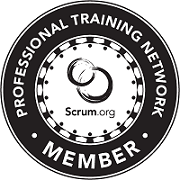The course covers the following key topics:
1. Scrum Basics
What is Scrum and how has it evolved?
2. Scrum Theory
Why does Scrum work and what are its core principles? How are the Scrum principles different from those of more traditional software development approaches, and what is the impact?
3. Scrum Framework and Meetings
How Scrum theory is implemented using time-boxes, roles, rules, and artefacts. How can these be used most effectively and how can they fall apart?
4. Scrum and Change
Scrum is different: what does this mean to my project and my organisation? How do I best adopt Scrum given the change that is expected?
5. Scrum and Total Cost of Ownership
A system isn’t just developed, it is also sustained, maintained and enhanced. How is the Total Cost of Ownership (TCO) of our systems or products measured and optimised?
6. Scrum Teams
Scrum Teams are self-organising and cross-functional; this is different from traditional development groups. How do we start with Scrum teams and how do we ensure their success?
7. Scrum Planning
Plan a project and estimate its cost and completion date.
8. Predictability, Risk Management, and Reporting
Scrum is empirical. How can predictions be made, risk be controlled, and progress be tracked using Scrum. Discussion starts with “Done and Undone” and continues with Quality Assurance in Scrum.
9. Scaling Scrum
Scrum works great with one team. It also works better than anything else for projects or product releases that involve hundreds or thousands of globally dispersed team members. How is scaling best accomplished using Scrum?
[su_testimonial_box position=”Live Virtual Training, 2021″]Fez was an absolute legend, she had wealths of information regarding Scrum and how it can be implemented in different conditions. It was very engaging and would be interested in more courses run by her.[/su_testimonial_box]




